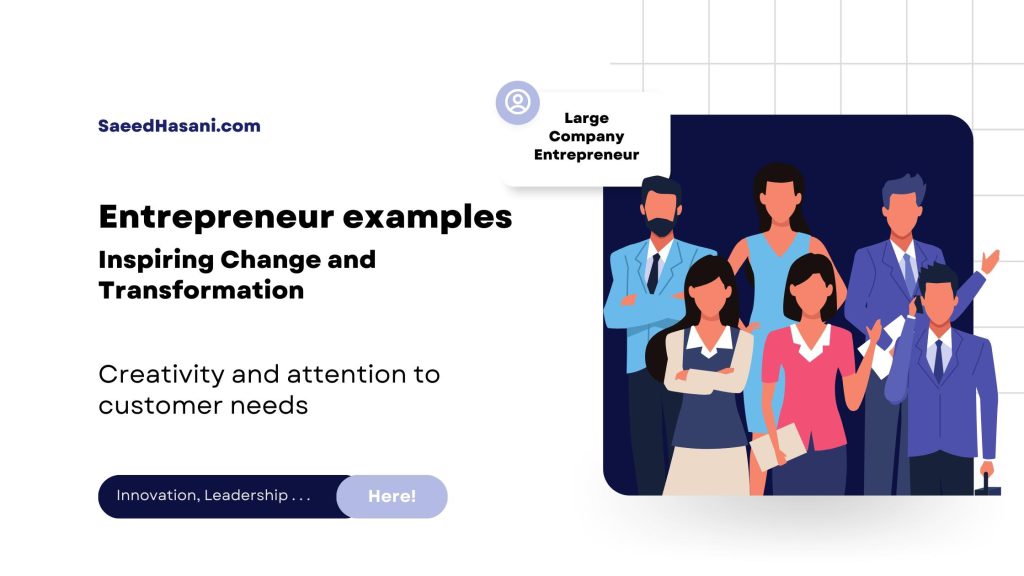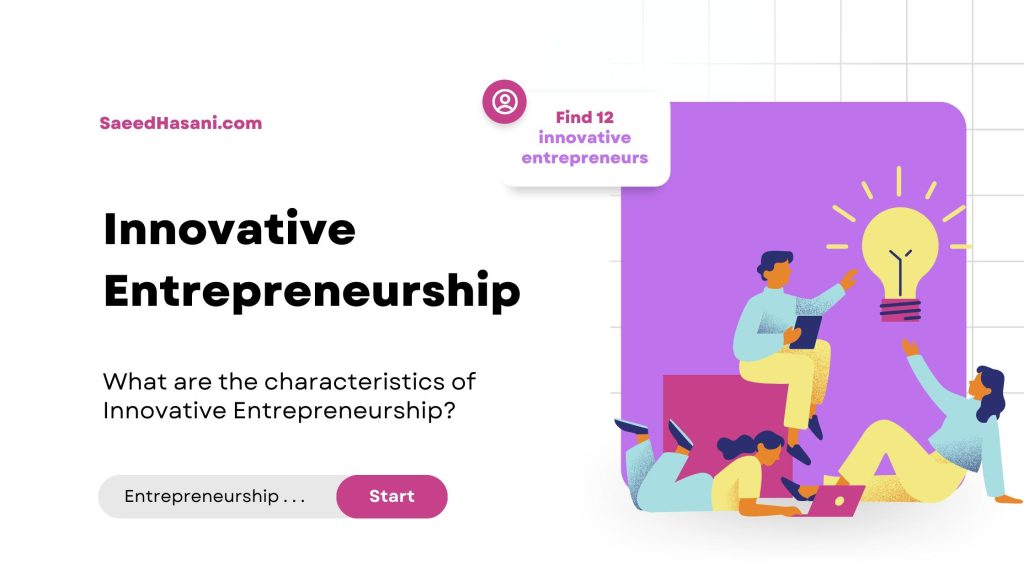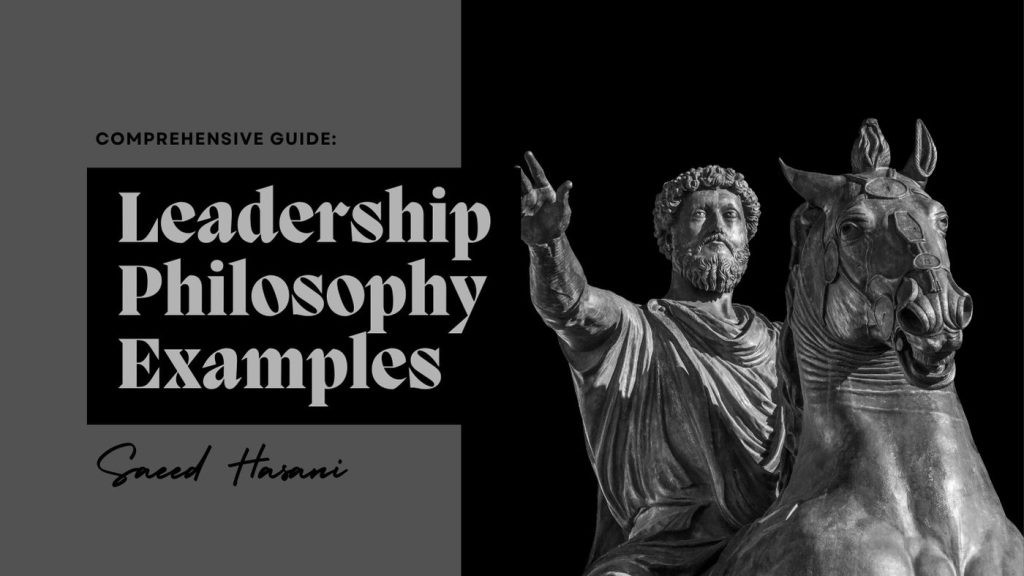Entrepreneur examples | Inspiring Change and Transformation

“Entrepreneur” is a term that shines as a beacon of ingenuity and change. The essence of this word includes the spirit of initiative, the drive to create, and the desire to create new possibilities.
Entrepreneurship is not just a title. It is a calling, a force that drives people to breathe life into new and unique ideas and turn them into thriving ventures. In this article, you will learn the multifaceted dimensions of the true meaning of being an entrepreneur. You will also learn from pioneering innovations shaping more industries and Entrepreneur examples. Entrepreneurs are the architects of progress; they create stories that inspire, empower, and shape the fabric of our society.
What does entrepreneur mean?
An entrepreneur is an individual who takes the initiative to establish and cultivate a new business venture, often to introduce a distinct product, service, or innovation to the market. Entrepreneurs are distinguished by their capacity to recognize opportunities, embrace calculated risks, and efficiently marshal resources to transform their concepts into thriving enterprises. They are pivotal in propelling economic expansion, job creation, and innovation across various sectors. Paying attention to Entrepreneur examples is very important to know the meaning of entrepreneurship.
Key traits of entrepreneurs encompass:
Innovativeness: Entrepreneurs are renowned for their ingenuity and aptitude to introduce fresh concepts or solutions that meet unmet demands or address market challenges.
Risk-Taking: Launching a new business carries inherent uncertainties, encompassing financial investments and potential setbacks. Entrepreneurs are prepared to embrace prudent risks to achieve their objectives.
Leadership: Entrepreneurs frequently shoulder leadership roles within their enterprises, guiding their teams, making pivotal choices, and charting paths for expansion.
Resource Management: Entrepreneurs must manage diverse resources, including finances, time, human capital, and technology, to realize their business goals.
Vision: Accomplished entrepreneurs possess a well-defined vision of their objectives and a strategy to attain them. This vision propels their decisions and actions.
Flexibility: Given the dynamic nature of the business domain, adaptability is vital; entrepreneurs must be open to recalibrating strategies in response to market dynamics.
Tenacity: Overcoming obstacles and setbacks is a customary facet of entrepreneurship. Entrepreneurs exhibit unwavering resilience in the face of challenges.
Networking: Establishing and nurturing relationships with potential collaborators, investors, clientele, and other stakeholders significantly contributes to an entrepreneur’s triumph.
Value Generation: Entrepreneurs aspire to generate value for their patrons, whether through innovative products, enhanced services, or streamlined processes.
Economic Influence: Entrepreneurial undertakings foster economic progress through job creation, innovation stimulation, and heightened competition.
Entrepreneurship encompasses diverse manifestations, from commencing a local small-scale enterprise to launching a high-growth technology startup. Moreover, entrepreneurs can be encountered within established enterprises, spearheading endeavors to innovate and expand existing operations.
Entrepreneurs are propelled by a sincere dedication to their visions and an unwavering determination to actualize them. Their contributions extend to shaping industries, enhancing lives, and forging enduring impacts on their communities and beyond.

Examples of entrepreneurship
“Technology and Software:
Technology and Software are the essential Entrepreneur examples. Steve Jobs and Steve Wozniak partnered to co-establish Apple, a venture that transformed personal computing, mobile technology, and digital music distribution. Mark Zuckerberg, the driving force behind Facebook, redefined global communication by creating the largest social media platform. Elon Musk, the mind behind Tesla, SpaceX, and Neuralink, founded a series of companies focusing on groundbreaking technologies such as electric cars, space exploration, and neurotechnology.
E-commerce and Retail:
Jeff Bezos laid the foundation for Amazon as an online bookstore, shaping it into a global giant in e-commerce and cloud computing. Jack Ma initiated Alibaba, an e-commerce platform that expanded into a diversified conglomerate providing various online services.
Fashion and Apparel:
Fashion and Apparel are some of the most common Entrepreneur examples. Ralph Lauren initiated the Ralph Lauren Corporation, renowned for the iconic Polo Ralph Lauren brand, which became an emblem of timeless American fashion. Anita Roddick established The Body Shop, a cosmetics and skincare company celebrated for its ethical and eco-conscious products.
Food and Beverage:
Howard Schultz revolutionized Starbucks from a local coffee bean retailer into an international chain of coffeehouses. Jerry’s Greenfield, Ben Cohen, and J founded Ben, an ice cream company. Why do we call them Entrepreneur examples? Because they are known for their creative flavors and commitment to social and environmental causes.
Healthcare and Biotechnology:
Entrepreneur examples exist for Healthcare and Biotechnology. Elizabeth Holmes embarked on the ambitious venture of Theranos, aiming to revolutionize blood testing with innovative technology, though the company encountered legal challenges. Dr. Patrick Soon-Shiong pioneered biotech firms NantHealth and NantKwest, advancing personalized cancer treatments and healthcare solutions.
Entertainment and Media:
By checking in Entertainment and Media, we find many Entrepreneur examples. Oprah Winfrey constructed a media realm encompassing a talk show, magazine, and production company, solidifying her status as a pivotal figure in entertainment. Richard Branson, founder of Virgin Group, expanded from Virgin Records to diverse sectors like music, airlines, and telecommunications.
Green and Sustainable Ventures:
Yvon Chouinard introduced Patagonia, an outdoor clothing company synonymous with environmental responsibility. Tom Szaky founded TerraCycle, a company dedicated to innovative recycling solutions for hard-to-manage materials.
Education and Online Learning:
You may ask if there are Entrepreneur examples for Education and Online Learning. Sal Khan pioneered Khan Academy, a nonprofit organization offering free online courses and resources, transforming education.
Social Impact and Nonprofits:
Muhammad Yunus championed microfinance by creating Grameen Bank, providing small loans to empower impoverished individuals and alleviate poverty. Blake Mycoskie initiated TOMS Shoes, a company adhering to the ‘One for One’ model, donating shoes to those in need for every pair sold.
These instances underscore the diverse spectrum of entrepreneurial pursuits that have left an indelible mark across industries and society.”
Large company entrepreneur examples
Bill Gates (Microsoft):
Co-founding Microsoft, Bill Gates propelled a technology company that reshaped personal computing by creating the Windows operating system and other groundbreaking software products.
Warren Buffett (Berkshire Hathaway):
Warren Buffett’s journey saw him transform Berkshire Hathaway, initially a textile business, into a conglomerate of diverse holdings encompassing insurance, utilities, and consumer brands, even though he diverged from the conventional tech entrepreneur mold.
Larry Page and Sergey Brin (Google):
Initiated Google as a humble search engine, which evolved into a colossal tech entity, offering a spectrum of services ranging from online advertising to cutting-edge cloud computing solutions.
Larry Ellison (Oracle):
The brainchild of Larry Ellison, Oracle materialized as a multinational tech corporation specializing in developing and marketing database software and advanced technological solutions.
Sam Walton (Walmart):
The inception of Walmart by Sam Walton marked the genesis of a retail giant that became a global powerhouse, establishing itself as one of the most prominent and successful chain stores worldwide.
Michael Dell (Dell Technologies):
Michael Dell’s entrepreneurial endeavor, Dell Technologies, flourished into a multinational technology titan celebrated for its computers, servers, and an array of related products and services.
Ingvar Kamprad (IKEA):
The founding of IKEA by Ingvar Kamprad introduced a multinational furniture and home goods retail sensation recognized for its cost-effective, flat-pack offerings and distinctive retail experience.
Akio Morita and Masaru Ibuka (Sony):
Akio Morita and Masaru Ibuka’s joint venture, Sony, emerged as a global powerhouse in electronics and entertainment, renowned for pioneering innovations in music, film, gaming, and electronics.
Herb Kelleher (Southwest Airlines):
Herb Kelleher co-established Southwest Airlines, a trailblazing low-cost carrier that revolutionized the aviation sector through an inventive business model.
Ray Kroc (McDonald’s):
Ray Kroc’s transformative efforts catapulted McDonald’s into a worldwide fast-food empire, significantly expanding the brand’s footprint and streamlining its operations.
Howard Schultz (Starbucks):
He transformed Starbucks from a local coffee shop into a global phenomenon. It is known for its distinct coffee culture and extensive network of coffee houses.
Mark Parker (Nike):
Mark Parker’s leadership elevated Nike into a premier global athletic footwear and apparel brand, celebrated for its pioneering designs and innovative marketing strategies.
Reed Hastings (Netflix):
Reed Hastings, co-founding Netflix, engineered a digital streaming platform that disrupted the traditional entertainment landscape, fundamentally altering how audiences engage with media.
Brian Chesky, Joe Gebbia, and Nathan Blecharczyk (Airbnb):
Brian Chesky, Joe Gebbia, and Nathan Blecharczyk coherently conceived Airbnb, an online platform that revolutionized the hospitality industry by connecting travelers with distinctive accommodations and experiences.
Travis Kalanick and Garrett Camp (Uber):
Travis Kalanick and Garrett Camp initiated Uber, a pioneering ride-sharing platform that redefined transportation norms and introduced the gig economy concept.
These entrepreneurs epitomize the blend of vision, innovation, and tenacity required to establish and expand impactful, large-scale companies across diverse sectors.
Conclusion
The concept of entrepreneur encompasses the dynamic force that drives people to forge new paths, shape industries, and help structure the economy. Entrepreneurs are the architects of change, bringing innovative ideas to life and driving them to success. They support economic growth, foster jobs, and inspire innovation across various sectors through their inherent ability to identify opportunities, take calculated risks, and effectively manage resources. Entrepreneurship includes innovation, leadership, adaptability, and a determined spirit that pushes them through obstacles.
Entrepreneurial, from technology and e-commerce to fashion, healthcare, and entertainment, their ventures have transformed industries, challenged conventions, and expanded horizons. These pioneers are the embodiment of courage, the embodiment of determination, and the embodiment of progress. They remind us that entrepreneurship is the driving force that propels societies forward and contributes to growth, empowerment, and sustainable change.







Responses